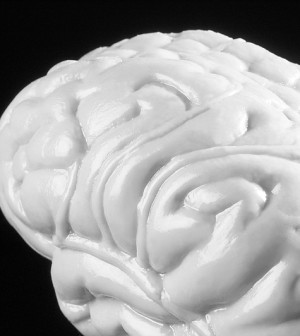- Could Your Grocery Store Meat Be Causing Recurring UTIs?
- Are You Making This Expensive Thermostat Error This Winter?
- Recognizing the Signs of Hypothyroidism
- 10 Strategies to Overcome Insomnia
- Could Artificial Sweeteners Be Aging the Brain Faster?
- Techniques for Soothing Your Nervous System
- Does the Water in Your House Smell Funny? Here’s Why
- Can a Daily Dose of Apple Cider Vinegar Actually Aid Weight Loss?
- 6 Health Beverages That Can Actually Spike Your Blood Sugar
- Treatment Options for Social Anxiety Disorder
Gene Test Might One Day Gauge Alzheimer’s Risk in Younger Adults

A gene test may one day be able to predict the risk for Alzheimer’s disease in young adults, a new study suggests.
People without any thinking impairments, but with a high number of gene mutations linked to Alzheimer’s, developed worse memory over time and had a smaller hippocampus — the part of the brain associated with memory and emotion, the researchers found.
“This implies that genetic risk of Alzheimer’s disease may exert an effect on the hippocampus very early in life, which may make those individuals more likely to get Alzheimer’s disease late in life,” said lead researcher Elizabeth Mormino. She is an instructor in neurology at Massachusetts General Hospital, in Charlestown, Mass.
Although the effects were small, they offer the possibility that genetic mutations may help spot people at risk of Alzheimer’s disease decades before symptoms start, she added.
But Dr. Sam Gandy, director of the Center for Cognitive Health at Mount Sinai Hospital in New York City, said people should not be rushing out to get tested to see if they have a high risk of Alzheimer’s.
“It’s only for research at this point,” he said. “It’s potentially very useful in designing super early interventions, but not clinically useful yet.”
For the study, Mormino and her colleagues calculated a genetic risk score based on whether a person had several high-risk gene mutations. The participants, average age 75, included 166 people with dementia and more than 1,000 people without dementia.
In addition, Mormino’s team looked for markers of Alzheimer’s, including memory and thinking decline, disease progression and the size of the hippocampus. They also looked at links between the risk score and hippocampus size in more than 1,300 healthy 18- to 35-year-olds.
The investigators found that among older people without dementia, a higher genetic risk score was associated with worse memory and a smaller hippocampus at the start of the study, accounting for 2 percent of the total variance in memory and 2 percent of the variance in hippocampus size.
Over a three-year follow-up period, a higher risk score was tied to greater memory and thinking decline and disease progression, the researchers reported.
Moreover, the risk score was linked with overall Alzheimer’s progression. Among the 194 participants who were healthy at the start of the study, 15 developed mild thinking impairment or Alzheimer’s disease. Of 332 patients with mild thinking impairment at the start of the study, 143 developed Alzheimer’s disease, the findings showed.
With each increase in the Alzheimer’s genetic risk score, the odds of the disease progression increased nearly two times, the study authors said.
Among the younger participants, a high risk score was linked to a smaller hippocampus. However, the risk score accounted for less than 1 percent of the difference in hippocampus size between those with high and low scores, the researchers noted.
The findings were published online July 6 in the journal Neurology.
“We are starting to put the pieces of the puzzle in place that look at what these genetic risk factors might mean,” said Heather Snyder, senior director for medical and scientific operations at the Alzheimer’s Association. “It’s a first step in that direction, but it’s not ready for prime time — we still have a ways to go.”
If you have a parent or a sibling that has Alzheimer’s disease, you are at an increased risk, and “there is nothing more that a genetic test will tell you about your risk,” she said.
In the future, genetic testing might predict risk and there may be ways to stop or slow the progression of the disease, Snyder said. “But we are not there yet.”
More information
Visit the Alzheimer’s Association for more on Alzheimer’s disease.
Source: HealthDay
Copyright © 2026 HealthDay. All rights reserved.










